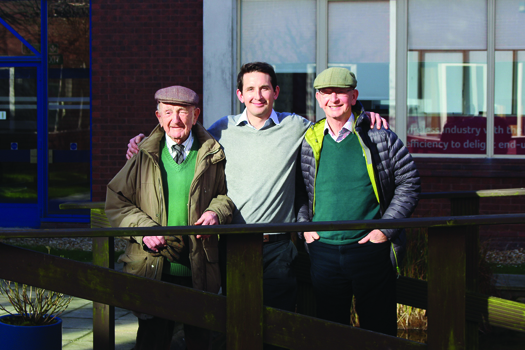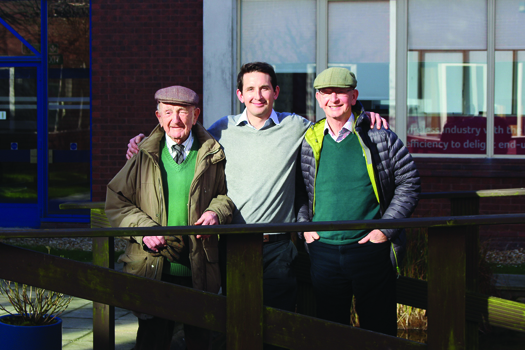A family doctor tradition


From left: Dr Alun Evans, grandson Dr Nick Evans and son Dr Peter Evans. Pic: NHS Dorset CCG
To meet Dr Alun Evans, Dr Peter Evans and Dr Nick Evans is to encounter three generations of family doctors.
Now 97, Alun began working in the NHS in 1948, during its very earliest days. After medical school in Cardiff, house jobs and a chest medicine role with the RAF, he followed his older brother Ieuan to the mining village of Rhymney, South Wales, to set up as a singlehanded GP with a list of 3,500 patients. Ieuan, also a doctor, worked at a cottage hospital in the village.
‘There were no appointments,’ Alun explains. ‘People came in on a Monday morning and by Monday evening it would be pretty full and later in the week it got quieter. The people were very nice and did not cause trouble.’
But he believes the NHS being free for all was – and is – a mistake.
We didn’t have days off very often and just two weeks holiday a year
‘It would have been better if people who could have paid then paid a certain amount. Bevan was a fool and had no idea about medicine.’
The cottage hospital’s X-ray machine was particularly useful for diagnosing the TB and ‘dust disease’ – mining related lung disease – that plagued many patients. But treatments were lacking.
‘It was the early years of antibiotics, which were wonderful. But there was plenty of asthma and not much treatment available for that, apart from giving adrenaline very, very slowly,’ says Alun. ‘For a suspected heart attack we gave them a quart of morphine and bed rest.’ There was also a shortage of specialists.
‘Patients would be stuck in our hospital for two or three months before they could get an appointment.’
The workload was considerable.
‘We didn’t have days off very often and just two weeks holiday a year.’
The biggest difference he noticed in his career was when patients began to have their own telephones and could contact him more easily. ‘To begin with there was maybe one telephone per street, but any of my patients could see me within half an hour, night or day, and I would never refuse to see anyone. But now GPs don’t want to work Saturdays.’
His son Peter, now almost the same age as the NHS at 69, studied medicine at Cambridge University and St Thomas’ Hospital London after deciding he wanted to continue the family tradition in medicine. After jobs in obstetrics, general medicine and paediatrics, he had the choice to become a GP or a paediatrician.
‘Then one weekend I came out the hospital and saw an Evening Standard headline about the Fastnet disaster; my wife’s brother had been in the same race, but after being in the hospital all weekend I knew nothing about it.’
The GP is now taking on more of a priest role and you have to work like the clappers or you are not going to get home
Peter saw a job advertised in Hampshire, which was around the time GP training programmes became mandatory, and took the plunge into general practice.
He was one of eight partners in a practice with 18,000 patients.
‘It was busy and being on-call was exhausting but when I qualified I had been doing 120 hour weeks. I did get stressed making calls and visits after surgery, but there is more scrutiny of GPs now,’ says Peter, who believes lack of diagnostics has led to the deskilling of GPs and recalls when fundholding encouraged GPs to expand their offering.
‘We did not get involved with fundholding at first because we were worried about being over stretched, but when we did it was excellent. We did minor surgery and 800 endoscopies a year on a pay-per-case basis, plus research and medicals after surgery hours, to augment income. Now GPs aren’t in a position to be entrepreneurial.’
Nick took the decision to move into general practice in 2008 after seeing how interesting his dad’s working day seemed, compared with his own daily commute to spend long hours in ICU and anaesthetics.
‘I would have put ten people to sleep and then they had all woken up again and that was it. I enjoyed managing more unwell people, but as you get more senior you get to do less clinical work. Most of my university friends are hospital specialists and clinics are the boring parts of their job, whereas for GPs that’s where the interesting stuff happens,’ says Nick, whose practice is in Dorset, where he is also a clinical chair at the local CCG.
Nick recently dropped from nine sessions a week to seven, and says he knows of only a few GPs working full time in practice now.
He believes GPs should become more like consultants, with a rejigged skill mix in practice.
‘The GP is now taking on more of a priest role and you have to work like the clappers or you are not going to get home. We need more time to see people and more access to imaging. It is not easy to do a good job and you are scrutinised a lot. Yet as income is capped you have to streamline your offering to maximise a partner’s salary.
‘There is a recognition of this where we are trying to come together to change the offering locally, so these are interesting times.’









